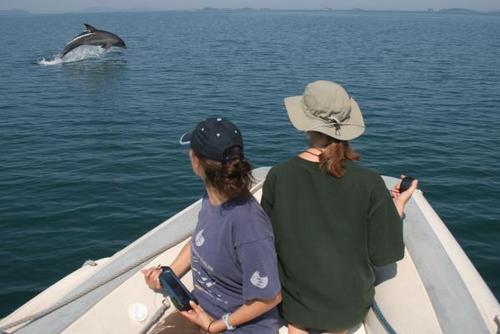Greece provides an irresistible blend of warm Mediterranean climate, fascinating ancient culture, and seas rich in marine life. Don’t miss this fantastic opportunity to learn about and make an active contribution towards the conservation of two of the world’s most charismatic and endearing marine species – the bottlenose and short beaked common dolphin.
By joining Frontier’s dolphin conservation project in the Mediterranean Sea you will be making a positive contribution to the protection of dolphin populations around the west coast of Greece, whilst at the same time gaining invaluable practical experience working for a marine research NGO and developing a wide range of conservation skills and techniques.
What Does The Project Do?
Dolphins have long held a position of significance within Greek mythology and culture since ancient times, with their strong and intimate bond with humans widely celebrated in artwork, and even on old Greek coins! However, despite their beauty, poise and popularity in modern society, dolphin numbers around the west coast of Greece are only a fragment of what they were a century ago.
Currently dolphins face a number of threats including habitat degradation, injury from boats and commercialised fishing equipment, prey depletion caused by overfishing, and noise and health effects resulting from increased in-water pollution rates.
There are still a number of key dolphin populations that inhabit and reproduce in the region, and so the protection of these elegant creatures is paramount. You will become a valued member of a dedicated team, committed to ensuring the conservation of a number of endangered dolphin species. The baseline data you collect will contribute towards the long-term management of the area and assist in promoting marine conservation in the wider Mediterranean region.
What Will I Be Doing?
You will be part of a dedicated scientific team focused on the study and conservation of schools of charming, lively dolphins in the beautiful coastal waters of western Greece. Your daily routine will vary according to the particular demands of the project at that time, but typically volunteers will split their time between conducting daily surveys at sea and helping to collate and process this information back at the field base.
You will work alongside experienced researchers who will train you comprehensively in data collection and analysis techniques. Each day you will take to sea on board the research boat, where you will actively engage in visual surveys, looking for dolphins, sea turtles and other marine fauna. Once dolphins are sighted you will help to record data on their spatial distribution, group size, composition (i.e. number of newborns, juveniles and adults) and behaviour.
Back at the field base after each survey you will help enter the data collected into the research databases. You will be taught how to correctly prepare digital photos of the dolphins for subsequent identification, and learn how to match these using the natural marks on the fin with the digital catalogue of known individuals. If you’re willing to get stuck in and engross yourself in valuable work contributing to the conservation of these charismatic and enchanting species then this project is perfect for you.


